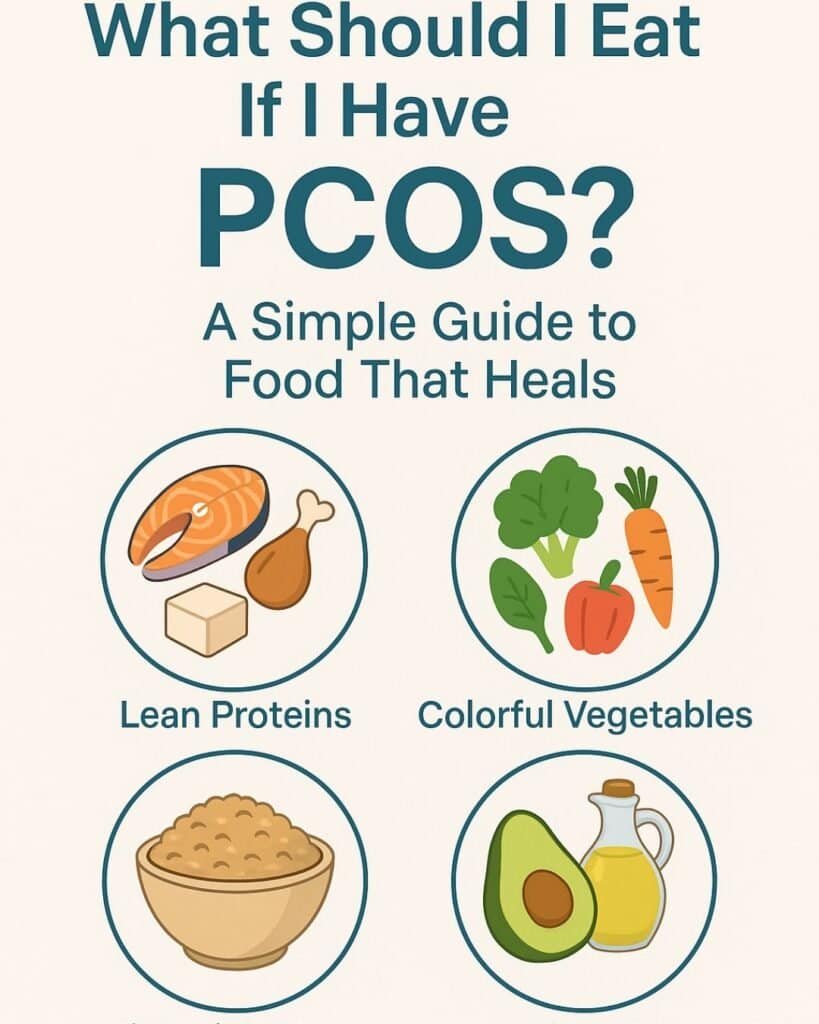
Imagine waking up every day wondering why your body doesn’t seem to listen to you. The stubborn weight gain, the painful acne, the irregular periods—it’s not “just in your head.” For millions of women living with Polycystic Ovary Syndrome (PCOS), this daily battle is real. But here’s the good news: food can be your strongest ally.
What Is PCOS and Why Does Diet Matter?
PCOS is a hormonal condition that affects up to 1 in 10 women. It’s linked to high levels of insulin (a hormone that controls blood sugar), inflammation, and imbalances in reproductive hormones. Many women with PCOS struggle with weight gain, facial hair, infertility, or mood swings.
Your diet can help balance hormones, lower insulin levels, reduce inflammation, and ease symptoms. It’s not about perfection—it’s about small choices that add up.
Top Foods to Help Manage PCOS
- Lean Proteins:
Think chicken, fish, turkey, tofu. Protein helps keep you full and stabilizes blood sugar. - High-Fiber Carbs:
Whole grains like oats, quinoa, and brown rice slow down sugar spikes, preventing energy crashes. - Colorful Vegetables:
Broccoli, spinach, kale, and bell peppers are loaded with antioxidants and fiber to fight inflammation. - Healthy Fats:
Avocados, olive oil, nuts, and seeds help balance hormones and improve cholesterol. - Low-Glycemic Fruits:
Berries, apples, pears—these won’t spike your blood sugar as quickly as tropical fruits.
PCOS: Foods to Limit (But Not Fear)
You don’t have to cut out everything you love. But reducing sugary drinks, white bread, and processed snacks can make a big difference. Instead of thinking “I can’t have this,” ask, “What’s a better choice for me today?”
Can Supplements Help Women Struggling with PCCOS?
Studies show that inositol may improve insulin sensitivity and restore ovulation. Some doctors also recommend vitamin D if your levels are low, since it’s often deficient in women with PCOS. Always talk to your doctor before starting supplements.
PCOS Is Not Just About Weight
While many are told to lose weight, not every woman with PCOS is overweight. And weight loss isn’t the only marker of success. Even small improvements in diet and activity can lower inflammation and improve fertility.
“I started focusing less on the scale and more on how I felt. Within months, my periods returned and my skin started clearing up.”
Emotional Impact in PCOS Matters Too
PCOS isn’t just a physical condition—it affects confidence, relationships, and mental health. Don’t be afraid to ask for help if you feel overwhelmed. Nutrition, therapy, movement, and medical care all play a role.
PCOS: Your Journey, Your Pace
There’s no perfect PCOS diet. Some women do well with Mediterranean-style eating; others with low-carb or plant-based approaches. Listen to your body, stay patient, and celebrate every small win.
Want more support? Visit vittafemme.com for resources, real stories, and expert tips.
References :
- Shahmoradi, L. et al. Nutritional management recommendation systems in polycystic ovary syndrome: a systematic review. BMC Women’s Health, 2024; 24(234):1-26. DOI: https://doi.org/10.1186/s12905-024-03074-3.
- Almhmoud, H. et al. Polycystic ovary syndrome and its multidimensional impacts on women’s mental health: a narrative review. Medicine (Baltimore), 2024; 103(25):e38647. DOI: http://dx.doi.org/10.1097/MD.0000000000038647.
- Fitz, V. et al. Inositol for Polycystic Ovary Syndrome: A systematic review and meta-analysis. J Clin Endocrinol Metab, 2024; 109(6):1630-1655. DOI: https://doi.org/10.1210/clinem/dgad762.
- Katyal, G. et al. Systematic review of the roles of inositol and vitamin D in improving fertility among patients with polycystic ovary syndrome. Clin Exp Reprod Med, 2024; 51(3):181-191. DOI: https://doi.org/10.5653/cerm.2023.06485.
- Han, Y. et al. Dietary supplements in polycystic ovary syndrome–current evidence. Front Endocrinol, 2024; 15:1456571. DOI: https://doi.org/10.3389/fendo.2024.1456571.
- Mimouni, N. E. H. & Giacobini, P. Polycystic ovary syndrome: progress towards a better understanding and treatment. Comptes Rendus Biologies, 2024; 347:19-25. DOI: https://doi.org/10.5802/crbiol.147.
Disclaimer: This article is for educational purposes only and does not replace medical advice. Always consult your healthcare provider for personalized guidance.

